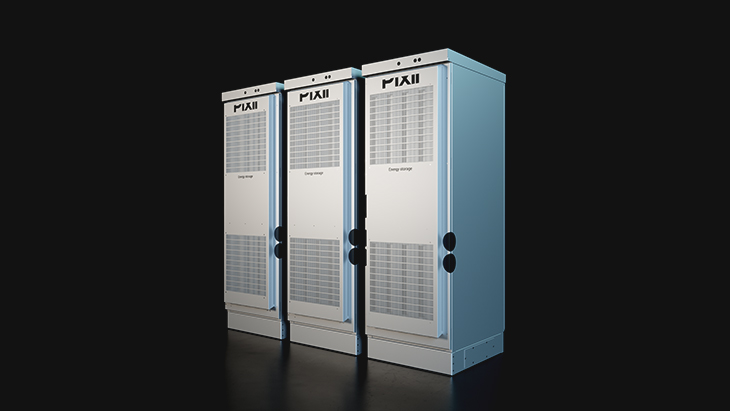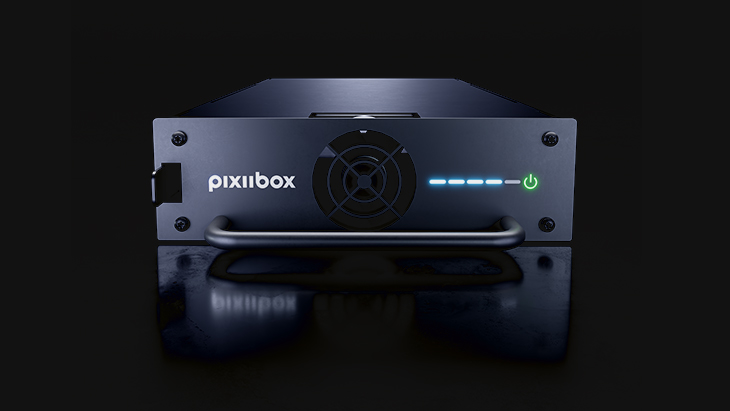Romania, is an important country in Europe for Pixii, told Volker Rossmann, CSO and Managing Director for Europe at Pixii. The company develops smart and efficient energy solutions based on modular and scalable batteries. “Large-scale projects are already a reality in many marketplaces, as the cost of technology is already at a level to generate sustainable profits”, Rossman added.
Each year, the interest in high‑power storage capacities is stronger and stronger. Does the offer keep pace with the demand?
T alking about Battery Based Energy Systems (BESS), we have seen increasing lead times as a result of growing demand and shortages and cost increases for important raw materials like Lithium, Cadmium, Copper, Microchips and others. Manufacturers try to fight these trends by investing in new manufacturing capacities. Whilst we see that in the domestic market lead times improved in Q1/2023, we recognize lead times of 12 months for industrial and grid-scale BESS.
alking about Battery Based Energy Systems (BESS), we have seen increasing lead times as a result of growing demand and shortages and cost increases for important raw materials like Lithium, Cadmium, Copper, Microchips and others. Manufacturers try to fight these trends by investing in new manufacturing capacities. Whilst we see that in the domestic market lead times improved in Q1/2023, we recognize lead times of 12 months for industrial and grid-scale BESS.
Has the price of technology declined enough to see large projects of energy storage? What are the trends in respect of price per MW?
Large-scale projects are not a trend only anymore but are already a reality in many marketplaces. The cost of technology is already at a level to generate sustainable profits. The base for BESS is a stable financial environment in combination with clear and feasible de‑regulation of the renewable energy market in the countries.
What are the most promising markets for your company – DSOs, micro‑ and off‑grid, residential, industrial, commercial, other?
Currently, we are focused on Europe including Scandinavia and on the APAC region. We are successful in several countries. The market drivers for Pixii as an Industrial BESS manufacturer are, besides commercial PV installations, in particular grid flexibility services like FFR and FCR, as well as EV‑infrastructure investments. Indeed there are many countries in Europe in which we see already today a lot of investments. I would here name particularly the Scandinavian countries and the Baltics, but also in the UK, Germany, Poland, Slovakia, Czech Republic, Holland and others we see growing demand. And at the end, with the growth of renewable energy production and all regions will follow this trend to invest. It means it’s just a matter of time.
Are there any particular differences between the situation in Romania and the characteristics of other countries where you are present?
I would say that Romania is still somewhat in an early phase of renewable energy development, and financial funding needs to be pushed. In any case, I see already a huge interest and things are moving forward quickly in a very good way.
Do you have specific approaches for each of these market segments? Are there any particular needs or fears you identified in each of them?
We as a manufacturer are investing all our know‑how, time and passion in the improvement of our products. It is our target to design products that can be used globally. What we all need to make the energy transition happen, is a stable and clear technical, commercial, and political environment. We hope that the politicians in Europe can create such good investment conditions for the renewable industries in Europe.
What are the main pillars of Pixii’s strategy for differentiating from other comparable providers?
 In Pixii we have an outstanding modular scalable technology based on our PowerShaper2 generation. This allows us to build extremely reliable and efficient BESS at a lower cost and in a shorter time than most of our competitors. This grade of standardization of our system allows us to build BESS in a range from 30kW/30kWh to 1,2MW/3MWh with the same hardware components.
In Pixii we have an outstanding modular scalable technology based on our PowerShaper2 generation. This allows us to build extremely reliable and efficient BESS at a lower cost and in a shorter time than most of our competitors. This grade of standardization of our system allows us to build BESS in a range from 30kW/30kWh to 1,2MW/3MWh with the same hardware components.
The whole European agenda is about energy transition and electrification as an enabler of it. Are there any EU programs that you find particularly useful for your industry?
As a manufacturer of BESS we cannot see that European programs would help us a lot. But depending on the market we know that our customers are using European funding.
What is the company’s ESG (Environmental, Social and Governance) strategy? Is there a priority pillar?
Pixii has clear and unambiguous policies in terms of corporate governance, sustainability and business ethics. Being a player in the green industry, it is important for us to adhere to the highest standards in these areas, and we continuously strive to improve when we uncover improvement potential.
Have you already in place a policy for dealing with waste after the decommissioning of the storage capacity?
We are of course fully aware of the need for recycling the various components in our systems to meet our target to be a supportive player in the circular economy. Consequently, we are in the process of establishing routines that will be in place in time for the future need in this area. Considering the life expectancy of our systems, there will still be quite some time until we will need to deal with substantial product recycling volumes. But we will be ready in due time.
What are Pixii’s short and long‑term prospects in Romania and in total?
Romania is an important country in Europe for us. The development of renewable energy solutions is probably still in an early phase, but Pixii is committed to investing and developing intelligent and efficient energy solutions with its modular scalable BESS.
_____________________________________________
This interview first appeared in the printed edition of Energynomics Magazine, issued in March 2023.
In order to receive the printed or electronic issue of Energynomics Magazine, we encourage you to write us at office [at] energynomics.ro to include you in our distribution list. All previous editions are available HERE.
